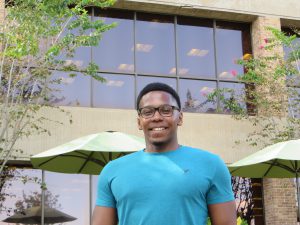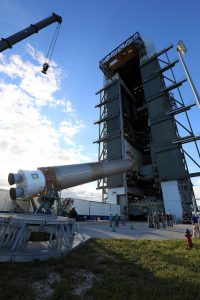When Jontavius Jacobs graduated from Harmony High School in Osceola County, he knew he wanted to become an engineer – but he thought his future was in biomedical engineering.
That is, until the summer of 2014, when he learned about NASA’s National Collegiate Aerospace Program through Valencia’s LSAMP program, a grant-funded program designed to encourage minority students to pursue STEM degrees.

Intrigued by the NASA program, Jontavius signed up for a six-week online course.
At the end of the course, he discovered he was eligible to participate in a week-long program at one of NASA’s four space flight centers – the Johnson Space Center in Houston; the Marshall Space Flight Center in Huntsville, Ala.; the John Glenn Space Flight Center in Dayton, Ohio; or the Jet Propulsion Lab in Pasadena, Calif.
But first, he had to submit a proposal for a mission to Mars – detailing what type of rocket he would choose, what the payload would contain, the number of astronauts he would send to Mars and, perhaps trickiest of all, he had to design a rover using CAD software.
Jontavius finished the proposal in fall 2014 and, in December of that year, was selected to travel to the weeklong program at Alabama’s Marshall Space Flight Center. There, he and five other teammates competed against seven other teams to build and design a rover using Lego Mindstorm kits.
“It was an awesome experience,” says Jontavius. “We had to build it, and then program it to get a rock sample and bring it back to a set location. Then we had to present our project.”
Inspired by the experience at NASA, Jontavius switched his career goal – from biomedical engineering to aerospace engineering.
“This program was a big deal for me,” he says. “I’m pretty heavily involved at Valencia” – serving as an officer in Phi Theta Kappa and the Model United Nations club. “But engineering-wise, it was still a little blurry for me. I wasn’t sure where I was going with engineering. But this program really crystallized my engineering path.”
After his experience at Marshall Space Flight Center, Jontavius participated in a job-shadowing experience at Kennedy Space Center. For a week, he drove an hour each day to Cape Canaveral – and initially, he wondered if the drive and the gas money was worth it.
He soon found out.

After spending a week with aerospace engineers, going to all their meetings, sitting in with them at work, they encouraged him to apply for a NASA internship. He landed one, and spent most of the summer of 2016, interning at Kennedy Space Center.
This fall, he got the chance to present a poster –about the history of Mars exploration – at Louis Stokes Midwest Center of Excellence conference, held in late October in Illinois. “I was nervous, but confident, because I knew the material. I almost lost my voice because so many people came up to my booth – and I had to present again and again.”
Now Jontavius, who’s 23, has set his sights on earning his bachelor’s degree in aerospace engineering – and is waiting to hear if he’s been accepted at his four target universities: University of Colorado at Boulder; University of Maryland at College Park; University of Illinois and the University of Central Florida.
“They’re all top 10 aerospace engineering programs, so I’m waiting to see where I get in. But I love cold weather, so I’m kind of hoping for Colorado.”
About Louis Stokes Alliances for Minority Participation (LSAMP)
Valencia College has joined with Seminole State College and Lake-Sumter State College as part of a National Science Foundation partnership under the Louis Stokes Alliances for Minority Participation (LSAMP) Program. Together, Valencia and the two other state colleges are working to broaden the participation of under-represented minorities in science, technology, engineering, and mathematics (STEM) education in Central Florida. Part of the mission, funded by a three-year grant, is to support students, increase their success, and provide students in the program with academic, skills development, and mentoring opportunities.
